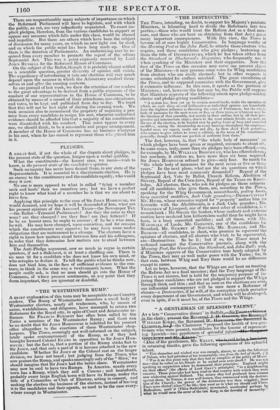"THE DESTRUCTIVES."
THE Times, intending, no doubt, to support his Majesty's patriotic Ministers, is labouring hard to divide the Reformers into two parties,—those who would treat the Reform Act as a final mea sure, and those who are bent on obtaining from that Act a great many important consequences. With this view, the Times is become all at once highly Conservative. In language worthy of the Morning Post or the John Bull, he attacks those electors I'vho require, and those candidates who give pledges ; bestowing on them the title of DESTRUCTI YES, which he has taken either from the Standard or Blackwood's Magazine, who frequently use it when speaking of the Ministers and their supporters. Now the fury of the ines on this occasion may serve one present objcet of the Ministers—it may procure some votes for Whig candidates from electors who are easily alarmed; but in other respects it seems calculated for endless mischief. The great circulation of the Times, and its supposed connexion with the Government, give it extensive influence. In this case, it speaks as the partisan of Ministers ; and, however the fact may be, the Public will suppose that Ministers approve of the following attack upon pledge-asking elector and pledge-giving candidates— "A system has been got up by certain mountebanks, under the operation of which no such thing as cool deliberation or individual opinion can henceforth have the slightest influence ie. directing the votes of Parliament, but the whole body of measures for the next seven, or five, or three years, or whatever may be. the duration of that assembly, not merely in their outline, but in all their pregressive and intermediate stages, down to the most minute details, are now, on the eve of the election, to belanded over by paltry knots of busy and conceited meddlers, seizing the dictatorship on every hustings throughout the empire,— handed over, we repeat, ready cut and dry, by these Jack Cade grandees, who assume to give orders to every candidate, in the name of his constituents generally, though without one particle of authority from them."
The fact, however, is, that "the whole body of measures" on which pledges have been given or required, amounts to about six. In some eases, truly, more than six pledges have been offered,—as, for example, by Mr. WILLIAM Bison GHAM, who has offered eleven; but nowhere, it strikes us, have more than six been required. Sir JOHN HOBHOUSE refused to give—only four. So much for "the whole body of measures for the next seven or five or three years." In the next place, what are the six questions on which pledges have been most commonly demanded ? Repeal of the Septennial Act, Vote by Ballot, Church Reform, Abolition of Slavery, Repeal of the Corn-laws, Repeal of the Taxes on Knowledge. All electors, then, who ask for pledges on these subjects and all candidates who give them, are, according to the Times, speaking for the Whig Government, mountebanks, paltry knots, busy conceited meddlers, Jack Cade grandees,—DESTRUCTIVES Mr. HUME, whose excessive regard for "property" makes him no favourite with the Abolitionists, is a Jack Cade grandee ; Mr. THORNELY of Liverpool, one of the most sober of candidates, is a mountebank ; Mr. GROTE the banker, whose modesty and extreme caution have rendered him hitherto less useful than he might have been, is a busy conceited meddler ; and all these, with air. MARSHALL Of Leeds, MT. GREGORY, one of the candidates for Stamford, Mr. GURNEY of Norwich, *Mr. BABBAGE, and Mr. BRISCOE—all candidates, in short, who promise to represent the opinions of electors, and all electors who wish to be represented, are—Destructives. So be It ; but if so, the Times must be reckoned amongst the Conservative journals, along. with the Morning Post, the Guardian, the Standard, and John Bull; and, if Ministers approve of the Conservative tone lately adopted by the Times, they may as well make peace with the Tories; for, in that case, between Whig and Tory there would be no difference except in name. Let us hope, however, that the Whigs are not bent on treating the Reform Act as a final measure; that the Tory language of the Times is not sincere, but is held for the temporary purpose of injuring those candidates who are not pledged to support the Whigs through thick and thin ; and that as soon as the elections are over, our influential contemporary will be once more a Reformer of abuses—a Destructive, if he will, of the corruption which pervades every department of our Government, and which will be destroyed, even in spite, if so it must be, of the Times and the Whigs.


























 Previous page
Previous page